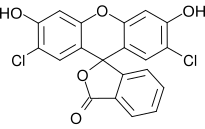This is the current revision of this page, as edited by Citation bot (talk | contribs) at 18:49, 30 June 2022 (Add: pmid. | Use this bot. Report bugs. | Suggested by Abductive | Category:Multiple chemicals in an infobox that need indexing | #UCB_Category 599/1863). The present address (URL) is a permanent link to this version.
Revision as of 18:49, 30 June 2022 by Citation bot (talk | contribs) (Add: pmid. | Use this bot. Report bugs. | Suggested by Abductive | Category:Multiple chemicals in an infobox that need indexing | #UCB_Category 599/1863)(diff) ← Previous revision | Latest revision (diff) | Newer revision → (diff)
| |
| Names | |
|---|---|
| Preferred IUPAC name 2′,7′-Dichloro-3′,6′-dihydroxy-3H-spirobenzofuran-1,9′-xanthen]-3-one | |
| Identifiers | |
| CAS Number | |
| 3D model (JSmol) | |
| ChEBI | |
| ChEMBL | |
| ChemSpider | |
| ECHA InfoCard | 100.000.881 |
| PubChem CID | |
| UNII | |
| CompTox Dashboard (EPA) | |
InChI
| |
SMILES
| |
| Properties | |
| Chemical formula | C20H10Cl2O5 |
| Molar mass | 401.20 g·mol |
| Except where otherwise noted, data are given for materials in their standard state (at 25 °C , 100 kPa).
| |
Dichlorofluorescein (DCF) is an organic dye of the fluorescein family, being substituted at the 2 and 7 positions by chloride.
It is used as an indicator for argentometry by Fajans method.
When used as an indicator, upon reaching the equivalence point of a titration reaction the color shifts from colorless towards a faint pink.
It is also used in the cellular antioxidant activity (CAA) assay. Dichlorofluorescin (DCFH) is a probe that is trapped within cells and is easily oxidized to fluorescent dichlorofluorescein (DCF). The method measures the ability of compounds to prevent the formation of DCF by 2,2'-Azobis(2-amidinopropane) dihydrochloride (ABAP)-generated peroxyl radicals in human hepatocarcinoma HepG2 cells. By itself, dichlorofluorescin (DCFH) also quantifies intracellular hydrogen peroxide as well as cellular oxidative stress.
References
- Kolthoff, I. M.; Lauer, W. M.; Sunde, C. J. (1929). "The Use of Dichlorofluorescein as an Adsorption Indicator for the Argentometric Titration of Chlorides". Journal of the American Chemical Society. 51 (11): 3273. doi:10.1021/ja01386a014.
- Bambach, Karl; Rider, T. H. (1935). "Volumetric Determinations of Halides: Use of Dichlorofluorescein as an Adsorption Indicator". Industrial & Engineering Chemistry Analytical Edition. 7 (3): 165. doi:10.1021/ac50095a012.
- Wolfe, K. L.; Liu, R. H. (2007). "Cellular Antioxidant Activity (CAA) Assay for Assessing Antioxidants, Foods, and Dietary Supplements". Journal of Agricultural and Food Chemistry. 55 (22): 8896–8907. doi:10.1021/jf0715166. PMID 17902627.
- LeBel, C. P.; Ischiropoulos, Harry; Bondy, S. C. (1992). "Evaluation of the probe 2',7'-dichlorofluorescin as an indicator of reactive oxygen species formation and oxidative stress" (PDF). Chem. Res. Toxicol. 5 (2): 227–231. doi:10.1021/tx00026a012. PMID 1322737.